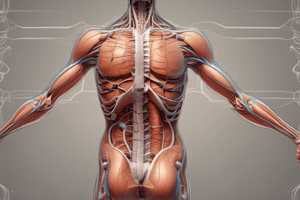Podcast
Questions and Answers
How do low-income families typically define health?
How do low-income families typically define health?
- In terms of access to healthcare services
- Based on their social interactions
- In relation to their educational background
- By their ability to work (correct)
What is a common belief among low-income individuals regarding illness?
What is a common belief among low-income individuals regarding illness?
- Illness primarily affects upper-income families
- Illness is a result of poor lifestyle choices
- Illness can always be prevented with proper care
- Illness cannot be prevented and is inevitable (correct)
What environmental factor significantly impacts the health status of people in depressed areas?
What environmental factor significantly impacts the health status of people in depressed areas?
- Proximity to healthcare services
- Availability of fresh food
- Sanitation and garbage management (correct)
- Access to recreational facilities
How can family patterns influence health according to the content?
How can family patterns influence health according to the content?
What role does culture play in how individuals perceive health?
What role does culture play in how individuals perceive health?
Which factor can contribute to conflict and stability issues within families regarding health beliefs?
Which factor can contribute to conflict and stability issues within families regarding health beliefs?
What is a benefit of having social support networks for individuals with health problems?
What is a benefit of having social support networks for individuals with health problems?
What misconception might certain cultural groups hold about healthcare practices?
What misconception might certain cultural groups hold about healthcare practices?
How do mind-body interactions influence health status?
How do mind-body interactions influence health status?
What role does self-concept play in handling stress during examinations?
What role does self-concept play in handling stress during examinations?
How can emotional distress influence the immune system?
How can emotional distress influence the immune system?
What does the cognitive dimension emphasize regarding health?
What does the cognitive dimension emphasize regarding health?
What is a potential effect of living in a tropical climate on health?
What is a potential effect of living in a tropical climate on health?
Which factor is most directly influenced by a person's standard of living?
Which factor is most directly influenced by a person's standard of living?
How does attitude influence health practices?
How does attitude influence health practices?
What can lead to self-deprivation of food in people with anorexia?
What can lead to self-deprivation of food in people with anorexia?
Flashcards are hidden until you start studying
Study Notes
Mind-Body Interaction and Self-Concept
- Mind-body interaction significantly influences health outcomes, impacting both positively and negatively.
- Stress responses vary among individuals, for example, students react differently to exam stress.
- Emotional distress affects the immune system through the central nervous system and endocrine system changes. This can increase the risk of infection, cancer, and autoimmune diseases.
- Emotional reactions (e.g., fear, depression) are triggered by physical conditions, such as a terminal illness diagnosis.
- Self-concept—an individual's perception of their needs, roles, and abilities—affects how they cope with and perceive situations.
- Attitudes influence health practices, stress responses, illness perception, and treatment decisions (e.g., anorexia nervosa).
Cognitive and Lifestyle Factors
- Lifestyle choices (living conditions, behavioral patterns) significantly impact health.
- Spiritual and religious beliefs also influence health choices and coping mechanisms.
Environmental Factors
- Climate (tropical vs. temperate) impacts disease prevalence (e.g., malaria).
- Environmental pollution affects health; asbestos is carcinogenic.
- Exposure to radiation (X-rays, sunlight), drugs, and air pollutants (e.g., sulfur dioxide from acid rain) can have detrimental health effects.
- Pesticides pose environmental and health risks through food contamination and improper use.
Socioeconomic Status and Health
- Health, mobility, and mortality are linked to socioeconomic status.
- Higher-income individuals have better access to healthy food choices and healthcare.
- Lower-income families may define health solely by work capacity and display fatalistic attitudes towards illness prevention, focusing primarily on immediate survival.
- Depressed areas with poor sanitation, overcrowding, and high crime rates negatively affect overall health. Lack of recreational spaces increases the risk of accidents.
Occupational Factors
- Occupational exposure to carcinogens and other hazardous substances poses health risks.
- Socioeconomic status influences stress levels, increasing the risk of stress-related illnesses.
Family, Culture, and Social Support
- Family lifestyle and patterns can be passed down (e.g., physical abuse), leading to long-term health problems.
- Open family communication, love, and support foster individual well-being.
- Culture influences perceptions of health and illness; traditional remedies might be favored over modern healthcare.
- Generational conflicts over traditional beliefs and values can cause stress and illness.
- Social support networks (family, friends) are crucial for preventing and coping with illness. They provide encouragement and assistance to those who are ill.
Studying That Suits You
Use AI to generate personalized quizzes and flashcards to suit your learning preferences.




